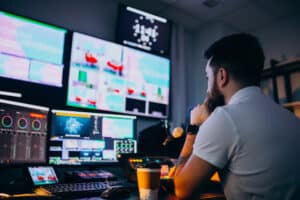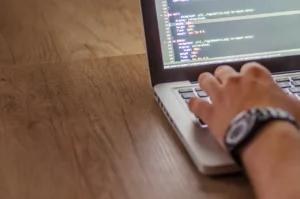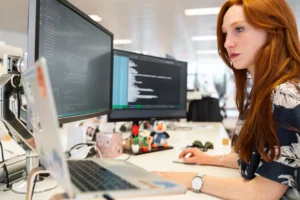Overview
In this article,
- You will travel with me through several chapters of our history of mankind and compile shreds of evidence on the impact of Artificial intelligence in human lives.
- I will try to describe our current situation and our moderately doable future, based on these shreds of evidence and my understanding of the humanistic creed.
So let's move on to our first question.
Is this post for me?
If you are intrigued to read in relation to a moderately doable future, which implies a great codependency of carbon-based humans in highly intelligent algorithms housed in silicon bodies – Based on our habits of the past 2 centuries, then you will enjoy reading this post with a cup of your favorite drink.
What is this post about?
This post is about a future that is based on our ideas and hopes of the past 200 years. Evidently, the real future could be something else entirely, but even if there is a slim chance, I am delighted to write about it.
Now, for some people, may seem a bit pessimistic, but it is better not to jump to conclusions. Our planet has witnessed the rise and fall of many cultures and civilizations. Egypt was ruled continuously by native pharaohs for about 2500 years. If someone could tell an Egyptian, in the time of Cleopatra VII, that soon the Egyptian empire will disappear, he would probably have been horrified. [1]
So here is a thought to start:
What will happen when artificial intelligence does practically everything that humans do?
To answer this question, let's go back, until a time when we could greet each other by shaking hands. In reality, a little more. I want you to meet me at the beginning of the 19th century. Most of the world's economies were divided into 3 sectors:
- farming
- Industry
- Services
the most of the population were engaged in agricultural activities that provided them direct employment to support themselves and their families. There was a minority of the population that depended on industry Y services for their livelihood.
A few years later, we witnessed the Industrial Revolution in many countries. People migrated from their field herds to the new mechanized factories. The revolution increased employment opportunities in the industrial sector as well as Service sector.
Now, let's advance the time, and 2x, until the beginning of the 21st century, developed nations experienced another revolution in which industrial works evaporated and job opportunities in the Service sector hail.
Year 2010, the 2% of the population living in the United States of America worked in the farming sector, the 20% of the inhabitants worked in the industry and a huge 78% of people worked as teachers, doctors, full stack developers, graphic designers and others service-based works.
Building on this trend of recent 2 centuries, Have you ever wondered:
What will happen when artificial intelligence begins to educate, diagnose and design better than a human?
Now, this is not a new question. You and I have seen these kinds of questions before. As an example, after the era of the industrial revolution, people protested that mechanization could cause mass unemployment and chaos. But we witnessed old jobs becoming obsolete and new jobs emerging and evolving!!
And the people? People comfortably urbanized society to what it is today.
But I have listened to many people, and I also believed in it, tell:
“There can always be something that humans can do better than machines”
But this is not a law of nature. This maybe not be permanent.
Let's look at ourselves from scratch. Broadly categorized, have 2 main types of skills:
- Cognitive habilyties: Brain-based skills we need to carry out any task, from the simplest to the most complex problems.
- Physical abilities: Our ability to do some physical activity without much application of brain skills.
Machines made our easier physical tasks and made us focus more on our cognitive habilyties. But imagine a day when machines pass us to retain, recognize and understand patterns.
I know what you might be thinking right now
“Oye, Hrishabh, there are many things humans are better more than machines thanks to our unique cognitive abilities. After all, We are incrementally superior to any other animal or hominid on the surface of this planet!!“
But before reaching any conclusion, let's take a tour of our recent history.
Chess: the biometrics of human intelligence
In the decade of 1980, people boasted of humanity's unique nature by routinely displaying chess as an endorsement of human superiority. They concluded that machines could never conquer humans in this game.
Jumping to february 1997, IBM's supercomputer called Deep Blue defeated Garry Kasparov in the heart of New York City. [2]
An equivalent account in the world of Go (play), Google's AlphaGo taught himself how to play Go (play) Y defeated South Korean Go Champion, Lee Sedol, in march of 2016. [3]
Baseball: The curious case of Moneyball
From the 19th century CE, professional baseball managers and scouts have used their instincts, wisdom, experience and expertise in the game to recruit and manage your players. They believed that baseball player selection is an art that only intimate and highly experienced people can master.. A mere machine or computer program could never reveal the secrets and spirit of baseball.
In 2002, Billy Beane of the Oakland Athletics decided to break the system and introduced an algorithm developed by statisticians and computer experts to create a team of losers who were overlooked by managers.. The result? Oakland Athletics became the first team in American League history to win 20 consecutive games. [4]
Facial accreditation: the birthright of human intelligence
According to a Stanford investigation, facial clearance is one of the first characteristics to develop in a baby's vision system. [5]
For a long time, facial accreditation had been regarded as an iron fence between the most powerful computers and humans.
Nowadays, facial accreditation programs are widely used by intelligence services and police forces to scan countless hours of surveillance content, since they are much more efficient and faster than humans.
Transport: Ingrese a Elon Musk
In 2004, Professors from MIT and Harvard published research on the labor market in which they categorized truck driving as an example of a job that had no chance of being replaced by automation in the foreseeable future. [6]
Nowadays, companies like Tesla aren't just promoting this, but they are turning it into reality, al implementing it further. [7]
Corporation: Ai On Board
Being a member of the board of a company or organization is a sophisticated portfolio. You need to demonstrate the breadth and depth of management and leadership qualities along with business acumen and relevant industry experience.
But, in may 2014, Hong Kong-based Deep Knowledge companies designated an algorithm called VITAL to its board of directors who can vote on whether or not the company should invest in a specific company, based on meticulous analysis of large amounts of data. [8]
Doctor iPhone
In 2015, Yale University researchers successfully demonstrated the use of artificial pancreas. A small sensor along with a small pump, connected to a small insulin tube, settled in the abdomen of patients. The sensor was in charge of measuring and reporting the patient's sugar levels to an iPhone. The iPhone housed an application that analyzed information and gave orders to the sensor that in return injected controlled amounts of insulin into the abdomen of patients without the help of humans. [9]
Therapy: Dr. (IBM) Watson
When was the last time you visited a therapist? I hope you didn't have to. But it is possible that you have been to a therapist at some time in your life. (Even if you don't trust me, you haven't missed anything).
Then, What does a therapist do? He understands your emotional state by examining external cues such as your facial expressions and the tone of your voice..
IBM's Watson is a Artificial intelligence that you can not only analyze your external signals more accurately than a doctor, it can also simultaneously analyze several internal indicators that are regularly hidden from human eyes and ears.. [10]
Music is art
Yes! Music is art. And according to Merriam-Webster: “Art is the conscious use of skill and creative imagination, especially in the production of aesthetic objects”
Reflects cultural values, narrates people's experiences in life over time. Need emotions. Art is exclusively human.
Seriously?
Take a second. Take over that Artificial intelligence take over like our doctors, like our drivers, like our teachers, they even handle our accounts and even our legal cases. Then, What exactly do we have left? Art seems like a virgin profession. What if everyone tries to become an artist? I do not believe it.
In 1989, a professor at the University of California developed an algorithm called EMI. During a blind test, EMI compositions were praised exactly for his shock and emotional resonance, even more than the artist's original composition. [11]
How will artificial intelligence affect us?
There is no doubt that the next technological advancements built on the foundation of Artificial intelligence will make our life easier. It might even be feasible for Artificial intelligence to feed and support humans without much effort on your part. But the crucial question is:
What will keep us busy and happy?
Drugs and virtual reality worlds can keep us engaged and provide much more intense and exciting engagements than boring outer reality., but with no work and purpose in our lives, we could feel useless and, Yes, Plus we might end up becoming Useless.
How can we avoid being the useless class of the 2050?
At the time I write this post, Artificial intelligence not even close to existence as a human being, but more than 95% of human traits and abilities are inefficient in finishing most modern jobs. To Artificial intelligence squeeze out of our jobs, it's just surpassing our skills in a particular profession.
Therefore, our goal should not revolve around creating new jobs for Human Intelligence. Our main objective should be to create new jobs where Human intelligence can work better than artificial intelligence.
Since you and I have no idea of the labor market circumstances in 2050, we have no idea what to teach our future generation. Most of the knowledge they acquire in their days of schooling may be out of date by the time they complete 30 years.
In general terms, our life consists of 2 etapas:
- The theoretical stage: where we learn and gain knowledge in school and universities
- The practical stage: where we work and apply our knowledge in real projects.
Soon the time will come when you are 2 stages of life become obsolete and the only way to be successful in life will be through constantly learningY developing our skills, throughout our lives.
References
- Linked in the respective benchmarks.
Thank you for reading, Have a good coffee! ☕
The media shown in this post is not the property of DataPeaker and is used at the author's discretion.








